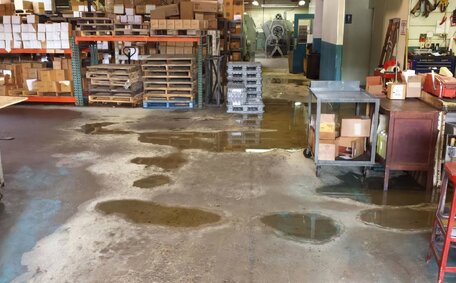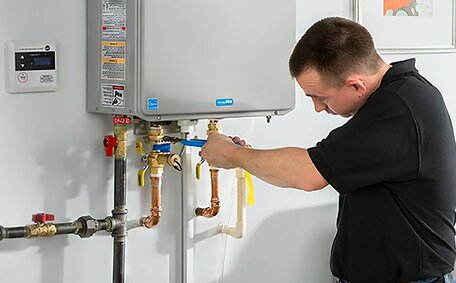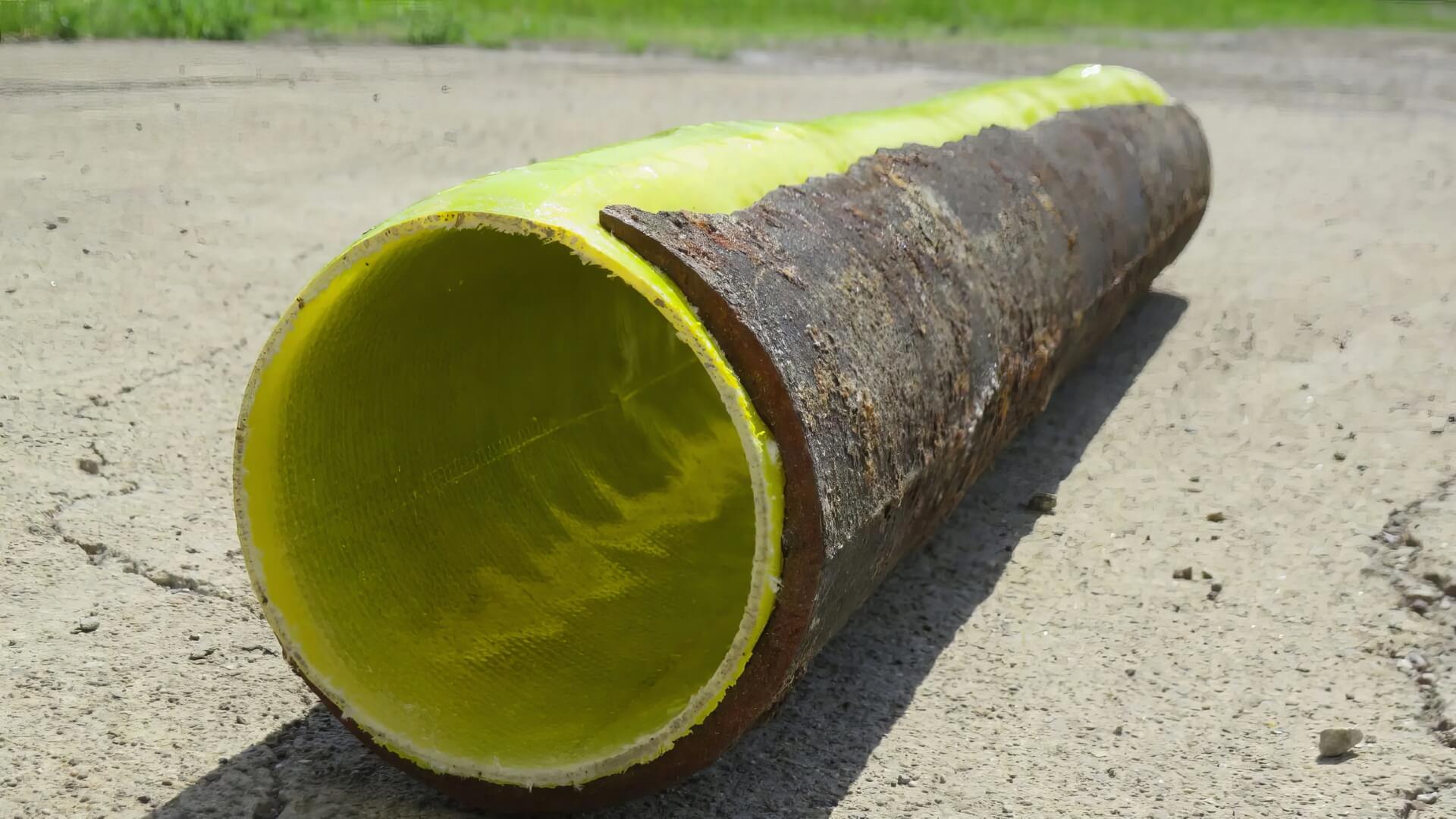
How To Fix Water Heater Issues
Can’t get hot water from your water heater? Try troubleshooting by checking the power supply, thermostat, heating elements and more. Call a pro plumber for repairs.
Read MorePipe relining is an innovative non-invasive plumbing technique that revitalises drain and sewer systems without requiring disruptive excavation. Our Sydney-based experts utilise advanced methods to restore your piping efficiently.
Ideal for worn or compromised pipes, sewer pipe relining restores functionality and flow without requiring property excavation. By inserting a new structural lining inside the existing pipe, we effectively renew its lifespan.
We explore trenchless pipe relining, a technique that ensures secure, efficient, and minimally disruptive maintenance for residential, commercial, and municipal piping systems.
Where traditional pipe replacement necessitates extensive excavation, pipe relining offers a minimally invasive method that can repair damaged pipes with ease. Inserting epoxy resin lining fortifies the internal walls of the pipe, essentially relining them without the need to unearth pipes buried beneath floors or foundations.
As a no-dig solution, Pipe relining circumvents the safety hazards and the need for disruptive drain excavation across your property. This ensures the surrounding infrastructure and landscaping remain untouched, free from excavation risks like trench collapses and underground utility damage.
The resin linings used are also safe, protecting drinking water from contamination. With emergency preparedness measures in place, pipe relining presents a low-risk and effective pipe renewal option.
When it comes to any plumbing job, worker safety should always be the top priority. Unlike pipe replacement methods requiring extensive excavation, pipe relining provides a safer alternative for our licenced plumbers.
For safety, we use epoxy resin with strict handling procedures to ensure a brief and secure relining process.
Our precise relining technique sustains your garden’s tranquillity and safeguards your property’s infrastructure from disruption.
We take precautions at access points to prevent exposure to potential toxic gases from damaged pipes, thus significantly reducing risks compared to traditional pipe replacement.
With expert training and years of experience, our plumbers provide very professional and safe services to repair pipes using relining in Sydney. As a cost-effective restoration option, pipe relining helps us protect your property’s integrity and our workers’ safety.
Ensuring our technicians are properly trained and officially certified is crucial when conducting pipe repairs via our relining services. Unlike the traditional pipe replacement process, pipe relining requires specialised equipment and materials like epoxy resin to be handled safely.
Our skilled plumbers, armed with relining expertise and official qualifications, conduct projects professionally, adhering to strict safety protocols and industry best practices through comprehensive training and evaluations.
Familiarity with the latest relining equipment allows our technicians to confidently navigate repairs with minimal disruption to properties. Strict compliance with safety gear and containment procedures also protects both workers and clients throughout the rapid relining process.
With extensive knowledge in piping systems and materials, our certified plumbers safely repair damaged pipes using our trusted methods, aligning with the highest industry safety and quality standards.
Our team uses helmets, eye protection, respirators, and protective clothing to maintain safety, adhering to strict protocols on PPE usage before entering confined spaces such as pipelines.
Safety harnesses and rope systems further protect technicians working in tricky positions inside pipes during relining.
With comprehensive PPE and training on safe usage, our technicians can complete rapid pipe relining without risk of injury. We also have fittings to prevent public contact with equipment at access points during repairs.
Adhering to safe work method statements, we take every precaution to make pipe relining a smooth, efficient and low-risk process for our skilled crews.
We conduct an in-depth site evaluation before initiating any pipe relining project. This crucial step identifies potential hazards to ensure we create the safest possible working conditions.
We ensure there’s sufficient access and ventilation for our equipment inside pipelines during the quick relining process.
Based on the site analysis, we implement emergency response plans tailored for each project. We also clearly mark out safe working areas at access points to prevent public contact with equipment. Job schedules are strategically planned around residents to minimise disruptions.
Our thorough preparation under the guidance of safety specialists allows us to undertake complex pipe relining tasks with minimal risk, ensuring clients’ peace of mind while restoring their pipes.
Before undertaking any pipe relining job, our technicians thoroughly inspect the work site to identify potential hazards. We check for dangers like toxic gases inside damaged pipes, underground utilities, confined spaces, and hazardous materials.
These inspections allow us to establish appropriate emergency plans and safe working zones. We also use gas detectors regularly throughout repairs to monitor air quality within pipelines. Thorough inspections are vital for preemptively spotting risks and ensuring safe working conditions.
When undertaking any plumbing job, establishing a secure work zone is crucial for protecting both our technicians and the public. We take every measure to prevent unauthorised access to equipment and work areas.
Safety barriers, warning signs and tape clearly identify the active work zone, while still allowing adequate access and ventilation. Public thoroughfares remain open but we reroute traffic away from access points to avoid accidental contact.
For interior pipe relining, we isolate access points in unoccupied rooms with lockable barricades. Technicians also continuously monitor and maintain the boundaries of the work zone throughout repairs. With restricted access, we ensure the safety of all involved.
When undertaking pipe relining, correctly handling materials like epoxy resin is vital for protecting our technicians and clients. We adhere to strict safety protocols including the use of appropriate protective gear when working with resins. Secure storage procedures are also implemented to avoid environmental contamination.
To minimise risks, we organise equipment and resin materials neatly in designated areas with restricted access. Proper labelling identifies potential hazards while our safety specialists oversee correct usage. We also have specialised containment measures for safe resin disposal after relining.
With stringent handling rules and the oversight of our licenced professionals, we are able to keep resin materials completely secure. Our priority is executing pipe relining services safely across residential and commercial premises.
Our technicians follow strict protocols, including donning chemical-resistant gloves and goggles, to safely handle epoxy resins during pipe relining. Proper ventilation controls are also a key aspect of our safety measures during application.
We adhere to regulated procedures for the storage and disposal of used resin materials after relining to avoid environmental contamination. Proper labelling identifies potential hazards while designated storage areas with restricted access minimise exposure risks. With stringent usage guidelines and oversight from our safety specialists, we maintain complete control over resin materials for maximum safety.
Ensuring we know exactly what materials require disposal is crucial when undertaking pipe relining to avoid environmental contamination. We adhere to regulated procedures for discarding used resin linings, containers and other hazardous materials after finishing repairs.
Waste resins and sections of old pipe are securely contained then collected by licenced waste handlers for safe processing. We keep detailed records of all discarded materials, including Safety Data Sheets, to ensure full compliance with local regulations.
With environmentally responsible disposal methods, our clients can have complete peace of mind that pipe relining services are undertaken safely and sustainably. As industry leaders, we make safety and regulatory adherence our top priorities across all projects.
Being prepared for potential emergencies is critical when undertaking pipe relining projects. As experienced plumbers, we have emergency response plans tailored for every job to ensure the safety of our technicians and clients.
We train our teams to promptly identify and respond to incidents like resin spills, gas leaks or trench collapses. With proper safety gear and containment equipment on hand, we can swiftly address any situation such as a burst pipe before it escalates.
Establishing evacuation procedures is also key. We strategically map exit routes and assign rescue personnel to evacuate workers and residents if dangers arise. Practise drills ensure everyone understands their emergency duties.
Thanks to comprehensive preparation, our crew can resolve unforeseen issues smoothly and safely. Our priority is always protecting the wellbeing of everyone on site with rapid, level-headed emergency responses.
Having a clear emergency action plan for pipe relining projects that are designed to last many years is essential to protect our technicians and clients when unforeseen incidents occur. We outline designated evacuation routes, assign emergency personnel and provide all crew with training on correct protocols.
Our emergency plans cover potential issues like gas leaks, resin spills and trench collapses. They include a list of emergency contacts to swiftly notify relevant authorities, along with details on appropriate response gear and containment equipment.
We also implement communication procedures using mobile devices, radios or shouting alerts to safely direct everyone on site in an emergency. Test drills of various scenarios ensure all workers understand their specific emergency duties to follow our rapid response plans.
With comprehensive preparation guided by qualified safety experts, we can respond promptly and appropriately if accidents arise during relining. Our priority is always the safe evacuation and care of workers and residents affected in any emergency situation.
Having readily available first aid kits and emergency equipment is vital for pipe relining projects. All our technicians are fully trained in providing first aid if accidents occur on site.
\
We promptly provide comprehensive first aid kits, complete with bandages, antiseptic creams, eye wash solutions, and trauma blankets. For respiratory issues, we have oxygen tanks and masks on hand. We also provide protective gear like chemical splash suits in case of spills.
\
Fire extinguishers, containment booms and neutralising agents equip us to promptly handle any resin leaks or gas emergencies. With gas detectors, torches, radios and backup power sources, we can respond safely if issues arise in confined spaces.
\
Regular inspections guarantee that our emergency equipment is well-maintained and ready for use, ensuring our trained professionals can quickly and safely address any issues during pipe relining.
Pipe relining provides enduring reliability for your plumbing system, with materials that resist root intrusion and corrosion, delivering structurally robust pipes that ensure the long-term safety and integrity of buildings.
We use only industry-approved resins and linings that cure to a durable state, forming a barrier within pipes that prevents contamination and protects structures. This method effectively deters tree root intrusion permanently.
Camera-assisted inspections verify pipe integrity post-relining, with regular checks to detect any faults during its designed 50-year lifespan. Homeowners can trust in our durable materials and workmanship for reliable and safe long-term function.
When faced with damaged or deteriorating pipes, your plumber can choose between offering you relining vs full replacement. While pipe relining vs replacement of a broken pipe involves less excavation, offering a trenchless solution that saves time, resources and disruption.
The pipe replacement process involves inserting an epoxy resin pipe liner into the current pipe, sealing any cracks and holes, thus forging a smooth new barrier inside. Tiny access points mean minimal digging, with most lines accessed via drainage systems. The resin cures to rock-hard durability, tackling our blocked and damaged pipes to last significantly longer than traditional relining alternatives.
Conversely, replacement can be highly destructive, potentially damaging your lawn with the use of jackhammers and backhoes. The process of digging trenches and laying new pipes can disrupt gardens and driveways, taking days to weeks compared to the few hours required for relining.
Cost-wise, relining is more economical at $80-$250 per linear metre, varying with pipe size and issue complexity. In contrast, replacement costs can exceed $400 per metre for materials like cast iron, once you include excavator hire and labour. Significant savings are evident with relining, especially since pipes often lie 4 or more metres deep, thereby inflating replacement costs.
For a solution that’s more immediate than traditional pipe repair through replacement, pipe relining is the non-destructive method that wins hands down. The innovative no-dig solution saves homeowners money without sacrificing safety or longevity. With relining more durable over 50 years, it’s a more cost-effective fix for the long run.
The benefits pipe relining does include a modern, minimally invasive solution for restoring blocked drains and sewer pipes across various properties. Opt for pipe replacement only as a last resort due to the need for extensive excavation; relining ensures your pipes can be renewed without digging up floors or foundations.
As highlighted throughout this article, we take every safety precaution when undertaking pipe relining projects to protect our skilled technicians and clients. From handling materials in a blocked drain to establishing emergency plans, we adhere to industry best practices and stringent guidelines.
Our professional plumbing team possesses extensive training and quality equipment, ensuring the safe restoration of old pipes, backed by our comprehensive warranties.
For affordable and reliable plumbing services in Sydney, especially expert pipe relining, reach out to Baulkham Hills Plumbing on 1300 349 338. Guaranteeing minimal disruption and long-lasting results, pipe relining mitigates any future concerns of pipe replacement for years to come.
Can’t get hot water from your water heater? Try troubleshooting by checking the power supply, thermostat, heating elements and more. Call a pro plumber for repairs.
Read MoreCloudy or milky hot water coming from your taps is generally harmless and caused by trapped air bubbles in the water. Simply running the tap for a little while will usually clear up the water. If the cloudiness persists, it could be caused by sediment buildup or issues with your pipes.
Read MorePipe relining involves inserting a tube inside damaged pipes to repair cracks and leaks without digging. This trenchless method may allow pipes and plumbing fixtures to be relocated during bathroom renovations. Contact our expert plumbers to understand if pipe relining can reposition your pipes and fixtures.
Read MoreBaulkham Hills, 2153 NSW
We will call back as soon as possible.




